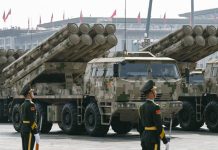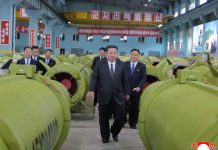
Washington – U.S. Secretary of State Marco Rubio agreed Tuesday with his counterparts from Japan, Australia and India to strengthen a free and open Indo-Pacific, just hours after he was sworn in as Washington’s top diplomat.
The four foreign ministers released a joint statement saying that “the rule of law, democratic values, sovereignty, and territorial integrity” should be upheld in the region, following a meeting of the grouping known as the Quad.
The meeting in Washington was the first major diplomatic event of the second presidency of Donald Trump, a day after his inauguration.
Rubio’s meeting, intended to discuss major challenges in the Indo-Pacific amid China’s rise in the region, with Japanese Foreign Minister Takeshi Iwaya, Australian Foreign Minister Penny Wong and Indian Foreign Minister Subrahmanyam Jaishankar indicates that the new Trump administration could be more supportive of multilateral cooperation than generally expected.
They said the four countries “strongly oppose any unilateral actions that seek to change the status quo by force or coercion” and remain committed to reinforcing “regional maritime, economic and technology security in the face of increasing threats.”
The statement did not single out any country. However, a Japanese official revealed that North Korea was on the agenda.
Rubio, a former Florida senator, has taken a hard-line approach to China that aligns with Trump’s stance. In his confirmation hearing before the Senate Foreign Relations Committee last week, he said China is “the most potent and dangerous near-peer adversary” the United States has ever confronted.
Arriving at the State Department for his first day ahead of the meeting, Rubio delivered remarks in which he reminded officials that voters decide the course of the United States and they have elected Trump.
“Our foreign policy is centered on one thing, and that is the advancement of our national interest,” Rubio said, telling them also that “there will be changes” in the way the department operates, but such moves were not meant to be “destructive” or “punitive.”
He stressed that the department needs “to move faster than we ever have, because the world is changing faster than we ever have.”
The diplomatic partnership of the four democracies was raised to the foreign ministerial level in 2019, during Trump’s first presidency.
His predecessor Joe Biden elevated the Quad to the leader level in 2021 and hosted the first in-person Quad summit in September of that year in Washington.
Iwaya told reporters Tuesday night at a Washington hotel that Rubio organizing the meeting just after Trump returned to the White House on Monday meant the new administration places special value on the four-way partnership.
The Quad’s origins date back to when the four countries coordinated their emergency responses and humanitarian aid following the 2004 Indian Ocean earthquake and tsunami.
Although the Quad is not a security alliance, it has often been regarded as a counterweight to China’s growing influence. Its areas of cooperation have been expanding in recent years, ranging from maritime security and infrastructure to health protection and emerging technologies.
The four countries have repeatedly underscored that they have come together to spread values such as democratic governance and the vision of a free and open Indo-Pacific, but China has criticized the Quad as an Asian version of NATO aimed at containing its growing influence.
Biden hosted a Quad summit last September in his home state of Delaware, at which the leaders used some of the strongest language ever issued by the group. Without mentioning China by name, they voiced “serious concern” over “the militarization of disputed features, and coercive and intimidating maneuvers in the South China Sea.”
“We condemn the dangerous use of coast guard and maritime militia vessels, including increasing use of dangerous maneuvers,” they said.
Notable new initiatives announced at the time included the launching of joint coast guard exercises. The move was seen as augmenting the security aspect of the Quad and sending a strong signal to China that its assertive maritime actions against smaller countries such as the Philippines were unacceptable.
BY: The Times Union – KYODO







